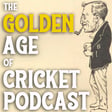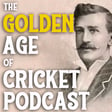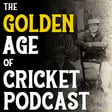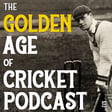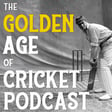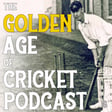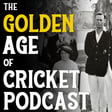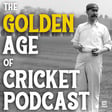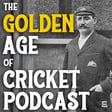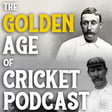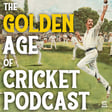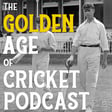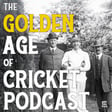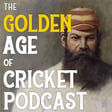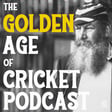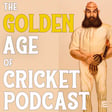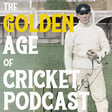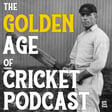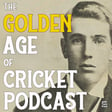Introduction to the Golden Age of Cricket Podcast
00:00:07
Speaker
Hello and welcome to this episode of the Golden Age of Cricket Podcast, a place to discuss the cricketers, matches and politics from the so-called Golden Age, immediately preceding the First World War. My name is Tom Ford.
Billy Murdoch: Achievements and Controversies
00:00:34
Speaker
Billy Murdoch was a colossus of Australian cricket in the 19th century. He captained Australia in its first victory on English soil, giving rise to the ashes. And as a stylish but determined batsman, he scored the first triple century in Australia and the first test double century. He's often been called Australia's answer to WG Grace.
00:00:56
Speaker
But he courted controversy too, bankrupted in his twenties. He secretly married the daughter of Victoria's wealthiest gold miner without his permission. He emigrated to England in 1890, as he and his wife aspire to make it in Edwardian society, often living beyond their means.
Authors Discuss Murdoch's Biography
00:01:15
Speaker
He even played a solitary test for England in South Africa. But what do we make of Murdoch's cricketing legacy today? And is he unfairly forgotten?
00:01:25
Speaker
For the first time on this podcast, I welcome two guests for an episode.
00:01:30
Speaker
Richard Cashman is a sports historian based at the University of Technology, Sydney. He is the author of 12 cricket books, as well as his memoirs, KakiHander, writing on cricket, sports history, and the Olympic Games. He has won the Australian Cricket Society Literary Award on three occasions for his book on Australian cricket crowds and his biographies of Fred Spofforth and Billy Murdoch, the latter written with my other guest today.
00:01:58
Speaker
Rick Sissons grew up in England, playing and watching cricket in Derbyshire. He is the author of 11 cricket books, including The Players, which won the English Cricket Society's Silver Jubilee Literary Award in 1988. His most recent books are The Glory and the Dream, the 1903-04 MCC Tour of Australia and the so-called Golden Age,
00:02:22
Speaker
JT Tildesley in Australia and with Peter Schofield when the Kangaroo met the Eagle, the 1913 Australian tour of Canada and the United States. Gentlemen, welcome to the podcast. Thank you. Yeah, nice to be here.
00:02:38
Speaker
So Billy Murdoch, cricketing colossus, published in 2019.
Motivation Behind the Biography
00:02:44
Speaker
Where did this idea generate that you needed to write a biography on Murdoch? And how did your collaboration come about?
00:02:55
Speaker
Well, I might start. It was obvious that Murdoch was Australia's first world-class cricketer and a great captain. And so there was a crying need for a biography.
00:03:09
Speaker
And it's interesting to speculate on why he'd been neglected so much in Australia. And I think my main answer is he became an Anglo-Australian. He identified with his English side and he migrated there. And there's an interesting story. Murdoch, half his life he lived in England and occasionally came back to Australia and he came back in a test match
00:03:36
Speaker
collapsed and died and instead of getting buried in Melbourne where the test match was, his body was embalmed and shipped back to England and he was buried in Kensel Green. Why we wrote this particular book, I seem to recall that both of us finished particular projects and we just happened to be talking about the fact that there wasn't the biography of Murdoch and he seemed like the most, at the time the most notable
00:04:04
Speaker
big figure in Australian cricket who hadn't been in biography, but we both lamented the fact that this was a massive project. Murdoch had played so many tests and so long for Australia, then which he'd just said had gone to England, he carried on playing, he played until he was well over 40, playing with W.G. Graceland.
00:04:25
Speaker
County. It just seemed like a big project. So as we were both sort of torn with the idea of doing this book, we thought, well, why not collaborate on the book? And then, you know, we broke up into difference, had a draft chapter breakdown, broke it up, and then used to swap chapters and work together collectively on it. And there you have it.
00:04:46
Speaker
My recollection is slightly different. No, no, no. You can see what you think of this. I had written a biography of Fred Spofford and Murdoch was his captain. Now very much linked. So I thought it'd be great to write a biography of Murdoch. And I started writing a biography
00:05:06
Speaker
And then I heard that someone else was interested in writing or starting to write a biography. And I thought, oh, so, but I know Rick quite well. So we contacted each other and it was terrific because we have different skillsets.
Murdoch's Convict Ancestry Revealed
00:05:24
Speaker
I knew a lot more about the early 1880s Spothosphere and he knew a lot about the later period because he was a CT returner.
00:05:34
Speaker
But also Rick is a bloodhound on ancestry. And he found out all these details about Billy's father that he was a bit of a rogue.
00:05:47
Speaker
Yeah, I mean, that was quite interesting, really, because once we'd started on, I mean, the sort of framework of Murdoch, I suppose, was quite clear in terms of his cricketing history. But the other books I'd done prior to that, Turner and Duff, for example, I'd used Ancestry a lot and built up family trees and
00:06:07
Speaker
contacted family and so on and so forth. So that had become quite important in the work I'd done on these other books. So through building the family tree of Billy Murdock, we actually came across a lot of quite astonishing information about him that he never himself ever spoke about in the few interviews that he gave, saying, cricket week record of the game or other magazines. He never said, for example, that on his mother's side, the family had a convict background, for example, both
00:06:35
Speaker
his grandfather and grandmother who arrived in Hobart were both convicts. Of course, the family never mentioned that because at the time that was something one did not speak about.
Financial Struggles and Dependence on Inheritance
00:06:45
Speaker
And then, as Richard just mentioned, his father Gilbert was an American who
00:06:51
Speaker
His mother met in the United States in California during the Gold Rush and they came back to Australia. Gilbert Pinkney Murdoch we discovered was somewhat of a rogue and eventually went back after a spell in prison in Beechworth for a year.
00:07:10
Speaker
went back to the United States where he remarried even though he had a family in Australia and he seemed to have a happy, bigamous life in the United States where he'd originally come from. So that all really came out of ancestry, which I think is a really invaluable tool these days for any biographer because when Richard and I were originally working years ago, you were trawling through
00:07:37
Speaker
What was that machine called that you wound stuff on? Microfiche. Oh my God. Working your way through newspapers and microfiche was terrible, hours of it. And then you never really got the family background. And it was then through ancestry that we got in touch with.
00:07:55
Speaker
Murdoch family. We found a great granddaughter who was also keenly interested in the history of her family, who was living in Sydney, and a great grandson who was living in the UK. We would never have found those people without her. They had a lot of bits and pieces and photographs
00:08:15
Speaker
We knew more in the end about Billy Murdoch than they did, which is often the case when you find families and cricketers. But nonetheless, they gave us some great information, some great leads and some great family photos. Of course, yeah. Can I just come in? A big challenge writing the biography of Billy Murdoch.
00:08:34
Speaker
is that he didn't write a lot himself. So we don't really know how he felt at key times of his life when he's involved in controversies. So you end up speculating, he'd do this.
00:08:49
Speaker
Rick, you mentioned his background and I have to say reading the book, it was one of the things that leapt out at me was his American ancestry. I had absolutely no idea about that. Was there anything else for you both that surprised you about Murdoch in your research? Something that either leapt off the page at you or you found was missing. That was quite obvious.
Impact of English Life on Murdoch's Legacy
00:09:18
Speaker
Well, for me, again, it was in the family and the social side when they'd gone to England because, I mean, the story of him marrying into the Watson family, the very wealthy JB Watson family marrying his daughter Jemima,
00:09:37
Speaker
It was in, you know, that was around, people knew that, but there was a collect, we stumbled across a collection of letters in the Watson archive in Victoria, which show what the situation of Billy and Jemima was in London, because they were, after JB Watson died, Jemima got a 600 pound stipend, which were the base that they were living off. Once they went to England, he just enjoyed himself playing cricket.
00:10:08
Speaker
So they were living off that and a thousand pounds out of the inheritance, the Watson inheritance for their five children. But they were continually writing begging letters to the executives of the Watson estate saying they were, you know, published, they couldn't pay the bills, they couldn't do this, they were thinking about what on earth they're going to do, were they going to come back to Australia. And that was also reinforced by the odd note in these archives of schools asking for payment and then Billy Murdoch got
00:10:37
Speaker
Ended up in court because he didn't pay a bill for some pigeon shooting and another letter cropped up not in this archive But another one where he was asking a player from London County would he lend him 25 pounds? So that really surprised me. I think You actually then got a picture
00:10:57
Speaker
Superficially, you would have thought, oh, they were doing incredibly well. They were part of a very wealthy family. He was playing cricket with G Grace. But behind the scenes, there was this huge turmoil going on in their lives. So that was a bit of a revelation, I must say, for me, finding those letters in the Watson archive. One thing that quite surprised me is after the solvency business,
00:11:24
Speaker
is Billy Kudemundra in the middle of nowhere he wrote. And he stayed there for about five years. I don't really understand why he did that. And there's a wonderful story of ladies, wonderful 323. Yeah,
00:11:45
Speaker
played for the first three days, then there was a court case in Kudamundra. So he went by train, late train, did the court case, came back the next day and appeared in the final day of the match.
00:12:02
Speaker
Couldn't do that these days, could you? Yes. And this is Kudamundra, obviously now famous for the birthplace of Bradman, but this is before Bradman was born, of course. So why he went to Kudamundra, it is an unusual choice. The middle of nowhere to get away from. Yeah, because he'd been declared bankrupt in Sydney. There is an odd connection to Bradman, though, in Kudamundra. Not that he went there for that reason, but as you said, Bradman was born there.
00:12:28
Speaker
Billy Murdoch knew Bradman's grandfather because Bradman's grandfather was farming in the area. And we know they must have known each other because they were both on the local race course stewards committee, which is sort of nice sort of irony. So he got Murdoch from Bradman. There is a sort of lineage thing, which is quite interesting. There is a sort of slight family connection.
00:12:55
Speaker
It also surprised me, you talked about this, is his attitude to money, aspired to live sort of really, really well and actually a bit beyond their means. So they're always short of money.
00:13:08
Speaker
Part of that is because he hung around with W.G. Grace too much. I think that was part one of his problems, probably overextended himself financially. They actually lived in the same street in Sydney for a time. You know, they'd be off at country house cricket batches or beagling or playing. They played golf together. They played bowls together and so forth. There is one very sad moment where
00:13:31
Speaker
Billy, he said, laments the fact he knocked on WG's door and he wasn't there and he wondered when he'd see him again. I think it sounded slightly as if WG had pushed him aside. But when the job came up at Lords for Secretary of the MCC, Billy Murdoch applied, but he didn't even make the short list. I mean, that reinforces the point Richard just said. In English society, in the cricket establishment at Lords, he was an outsider.
00:13:59
Speaker
having a bar of Billy Murdock the Anglo-Australian. Not only an outsider but he was a bit of a cowboy sort of you know always sort of pushing boundaries
Research Disagreements: Betting Allegations
00:14:09
Speaker
and etc. Listening to you both talk here I'm getting a great sense that you don't always agree on things which is healthy I mean I've never written a book let alone co-written a book so
00:14:22
Speaker
Were there aspects of writing this book that you disagreed on in terms of research and the interpretation of that research? Yes.
00:14:31
Speaker
I think there's only one. One major one. Richard has a much more rigorous, stronger academic background than me. There were two, one minor thing. Richard insisted we have footnotes. I don't think I'd written a book until then which had footnotes. So the book is meticulously footnoted. And then there was the question of did Murdoch and the Australian team bet?
00:14:57
Speaker
in the first Ashes test, which became known as the first Ashes test. I really wanted to put that in the book because we had a newspaper article, albeit published in the late 1920s or 30s in a few newspapers, which detailed the money that Charlie Beale and several players won betting on Australia. They weren't betting against themselves or betting on Australia in that test match, but Richard
00:15:25
Speaker
Because he's more rigorous, I guess, than me. He said, nope, we need to have two sources to verify this. So it didn't go in. Subsequently, Rodney Uliate did find a second reference to this. Still won't go in. Right. Well, if there's a secondary printing of the book, perhaps, or a special edition, we can add it as a footnote. Because I think you're still skeptical about this. Yes, you never. My view is that these papers were gossipy.
00:15:54
Speaker
and things were floating, all sorts of things were floating around. And one newspaper in some obscure town would publish it and another would copy it and go on and on and on, like that. I still feel it was out of character because he was involved in, he played in a match at the Sydney Rite of 1879 when Lord Harris criticised the bookmakers who had been
00:16:22
Speaker
said that the bookmakers fomented the riot, which no doubt they did. And then when they went to England in 1880, because of that,
00:16:34
Speaker
taint on Australian cricket. They couldn't get matches very many times. So, it seems to me that Murdoch probably, well, I find it hard to reconcile that. That it's possible. But I don't think it should be. The only argument against that, well, the argument
00:16:55
Speaker
is that Billy Murdoch gambled a lot. He loved the horses. There's lots of anecdotal evidence that he lived when they lived when he was playing for Sussex. He never missed a race meeting in Sussex. He was always at the race meetings. And there's a story in another
00:17:12
Speaker
where he came very close to winning a very large amount of money on the horses. Again, that's not substantiated anyway. It was just anecdotal evidence. So I think he did like to gamble. And there's another funny reference when Jemima writes to the executives of the Watson estate. She's writing to McKeon and who was her brother-in-law
00:17:39
Speaker
Her elder sister had married Malcolm McKinnon, who...
00:17:43
Speaker
was Lord Mayor of Melbourne, was an MP in Australia, made a fortune on shipping frozen meats, went back to England, lived in a large country house, and made a lot of money.
Murdoch's Leadership and Concentration
00:17:55
Speaker
Anyway, she says to McKiernan, I love Billy, despite his one fault, and she never says what the one fault is. What is this personality fault? We've no idea, and it's quite interesting to speculate. Could it be gambling?
00:18:20
Speaker
So yeah, could he have gambled, put money on the test? I think it's quite possibly good. There's so much about Billy that we don't know and fully understand. But I still admire Billy because he had great concentration. He was a brilliant batsman. He was able to concentrate and hit big hundreds in an era. Like when he got the 321 for New South Wales,
00:18:41
Speaker
But there was something, obviously something there.
00:18:47
Speaker
No previous New South Walesmen had even got a sentry. And the other thing is he was a great captain. I think in the 1882 test, famous test, he was calm and he kept his head.
00:19:02
Speaker
Yes and a great leader of men because we learned from many of these tours to England of the Australians in the 1880s and even I think the 1912 triangular series the group were completely unruly because for whatever reason the captain at the time wasn't able to reel them in but it sounds like Murdoch was a great leader on and off the field.
00:19:26
Speaker
Yeah, that's definitely true, and it's certainly true, particularly in the 1890s. The last tour he was captured on was 1890 itself, when Murdoch and his mother actually used that as an excuse to move to England. But he was a good captain of the 1890s side.
00:19:48
Speaker
There was some talk that he might have kept in the 1893 side which was a complete shambles of a tour, rifts and fissures inside the team and people said the only person who could control that team actually was Murdoch and there was some possibility he was going to become
00:20:05
Speaker
the tour captain but and he'd been negotiating with Cohen, Victor Cohen and the end Victor Cohen reneged on it and said Australia doesn't want an Anglo-Australian captain and you know that I think that tour could have been quite different if Murdoch had have been he could have controlled the likes of George Giffen and his brother Walter. Rick how do you think he exercised that control?
00:20:33
Speaker
Well, I mean, there are a couple of stories of the... Well, I think first of all, because he was such a great player, I think there's obviously a massive amount of respect. Yes, absolutely. But he also seemed quite determined, that story where somebody questioned whether they should bowl or not, and he just made them bowl all day.
00:20:54
Speaker
It seemed to be quite authoritarian at times with as clear as bowlers. And there were also times when you have old Turner and Ferris for ridiculous amounts of time. So I think it was the combination of the two, the respect and the authoritarian. And Spoff is very much a prima donna. And he was able to manage him. But somehow Murdoch was able to get the best out.
00:21:19
Speaker
Be a sport and join the fun, jolly good fellows, everyone. Come along, be one of the boys.
00:21:33
Speaker
Richard, you mentioned earlier in the podcast about Murdoch's death, which happened at the MCG in 1911 during the test match. I think he died or collapsed in the old long room. And this is how you
Murdoch's Death and Desire for Anglo-Australian Society
00:21:49
Speaker
begin the book. Why did you start with his death in this particular publication? I thought it's just so unusual. Someone died at the MCG.
00:22:02
Speaker
Why do you embalm the person, the cost, and ship them all the way back to
00:22:09
Speaker
be buried with his mother, Kensil Greene. So I thought it was a pretty dramatic moment. Interesting. I was really happy to do that because I didn't really want the book, although of course it is. I mean, the book is linear, but taking that and putting that right at the front, it also really epitomizes, as you said, what was his desire to be so Anglo-Australian and be part of the English
00:22:38
Speaker
world and Edward in England, which he obviously in the end actually failed to be. But yeah, I thought it was good to put it right up the front like that. It really epitomised the whole nature of Murdoch and his life. And using contemporaneous reports as much as we can from 1911, what do we know about the actual death? Was it a heart attack?
00:23:01
Speaker
I believe so. That's right, isn't it? Heart attack. Heart attack was stroke. I can't remember. I don't know. It was a, it was a stroke and he had a health problems. He eventually retired, I think in 1904 from London County and he'd been repeatedly, his doctorate repeatedly told him, you know, and there were seasons when he didn't play a whole season. Remember he's overweight, right? And he is now in well into his forties.
00:23:24
Speaker
it's obviously had some sort of health problems he had weight problems so in that period from after you left london county to nineteen eleven. There were obviously continue health problems here and then he had a stroke of the mcg and died nearby.
00:23:42
Speaker
I mean, to look at a photo of Murdoch through modern eyes, it is remarkable to think that he was a leading sportsman of his day, the same with Alfred Shaw, he bowled the first ball and test cricket, looks anything but a modern cricketer anyway, so. Yeah, if you look at that photograph taken in Coventry for WG's 50th birthday and there's Grace and Murdoch together, two most unlikely sporting figures you could imagine. Yeah.
00:24:07
Speaker
But he had a good keen eye. He was a good pigeon shooter. Yes, that's true. He was a very good pigeon shooter. He obviously carried on pigeon shooting for
00:24:18
Speaker
virtually throughout his life and competed internationally at pigeon shooting. A really bizarre sport. When he was in Melbourne, I recall that he was involved in some club there and they used to bring in 25,000 pigeons a year to shoot. I mean, just like mass carnage of poor old pigeons. Billy was in the forefront there banging away. I wonder if Bill Laurie knows anything about this, about his
00:24:43
Speaker
you know, the predecessor as Australian captain. Now you've mentioned this briefly and I just want to go back to his, I wouldn't call it first retirement, but he stopped playing cricket in 1884. I think, as you say Richard, he was at the top of his game as a batsman and as a leader and he just suddenly decides to stop playing cricket and we don't hear again
00:25:08
Speaker
about his cricketing feats until that 1890 tour. So, as his biographers, what do you make of that five-year break? Why do you think he did it? Well, I think he was fed up with cricket because there was a big fight about gate money. It came
00:25:30
Speaker
He also had the problem with clandestine marriage. So he had a lot of, he didn't say anything about it. So I don't know what he actually felt. I mean, there seems to be, okay, so JB Watson, Jemima's father, did not approve of the marriage and did not approve of Billy. Seems the question about the mother, because she gave Jemima the money to go to Melbourne to marry.
00:25:56
Speaker
but JB Watson, who'd gone to Victoria and made money on the gold fields, Scottish migrant, was down to his last two shillings and then he struck gold, but he did not like Billy Murdoch and he probably also knew about Billy's
00:26:12
Speaker
father of a dubious character because he was also in Bendigo. So he didn't like Billy. Billy had married Jemima. They were now in Cootamundra. But there does seem to have been some sort of reconciliation. And Billy starts to play cricket again immediately after JB Watson died. So sort of the impression we have is that as part of this reconciliation, the children, they've now got two children,
00:26:41
Speaker
to JB Watson, ensuring Jemima doesn't get completely cut out of the wheel. It looks, and then Billy also begins to get a bit of legal work when they've moved from Cootamundra to Melbourne. He gets work from the Watson businesses and from McKeon. And it looks like there may have been some sort of reconciliation there, but the condition being that Billy doesn't play cricket. Sure. I don't need to surmise that because he immediately, Watson does, he starts playing again.
00:27:09
Speaker
And he joins or leads the 1890 tour to England, so this is five years later. But I think you mentioned earlier, Ricky, he ties it in with the opportunity to move his family to England. Why did he leave Australia and why did he want to live in England? I think part of that is what Richard's already said about him wanting
00:27:32
Speaker
this Anglo-Australian myth and wanting to be, you know, people still perceived England as home. And they still talked about cricket tours being, oh, we're going to play at home, i.e. in England, which was all really bizarre. The secondary point is that Jemima wanted her children to be educated in England.
00:27:52
Speaker
And so that was part of the movement. They'd got two children already and had three more once they, in the early years they were in England. And one boy went to Harrow, one boy went to Repton, and the girls went to various private girls schools. So that seemed to be Jemima pushing to her children to have an education. That's the only other reason they were so keen to go.
00:28:20
Speaker
So let's talk about that 1890 tour and just to preface this for the listeners, we are primarily talking about the back end of Murdoch's career because this is the so-called Golden Age podcast. But we will mention his earlier career just to contextualise.
00:28:39
Speaker
this 1890 tour again to modern years it sounds just so foreign the idea that you would play 40 matches over there these days they arrived two days before the first test and play golf as a warm-up but back then they play various first-class matches reading your book you know I learned that Murdoch is probably the best batsman on
00:29:07
Speaker
Australian tour, he scores more runs than anyone else, including two first class centuries. But on the test front, he doesn't have the most successful time. He only scores, I think, 19 runs and a high score of nine. Where was Murdoch at this point in time with his test career?
Decline of Test Career and Focus on Leadership
00:29:30
Speaker
I mean, was test cricket now beyond him, do you think?
00:29:35
Speaker
Can you answer that? Well, I think it was, yeah. I think his career clearly falls into two parts, the early part where Richard spoken about these massive animate, you know, feats of concentration.
00:29:45
Speaker
the triple century, the double century, plus that innings where Grace scored, was it 152? And Murdoch went in and scored 153 to win the game and win a sovereign, which he always kept on his way. It was a draw. It was a draw, was it? But he won a sovereign. He won a sovereign off Grace out of bed. And I think compared then to later years is, yes, definitely his career at Platt completely by 1890. I think at that point, really,
00:30:13
Speaker
he was there to captain and lead the side more than anything. I mean, and the fact he only scored two first-class centuries as well, that was against, in all those matches, against some bowling attacks were pretty mediocre. I think well and truly past his best by this point.
00:30:49
Speaker
So perhaps his test career was coming to an end, but he still obviously felt like he had a lot to give cricket at the first class level. So he's now with his family living in England and he applies to play for Sussex. He applies to Lord Sheffield, all sounds very formal, but there was a two year residential qualification. So he couldn't technically play first class cricket for two years, not until 1893. So how did he,
00:31:18
Speaker
spend those two years. Was he able to play some other form of cricket or did he take up other forms of entertainment?
00:31:27
Speaker
one chunk of time when you went on that tour organized by Walter Reed, a Surrey amateur who's paid a ludicrous amount of money, £750 by the South Africans to bring the side out. And Murdoch was paid, I think, £250 or £300 to undertake this tour, way more than any of the professionals were getting for that tour. So that's one thing that he did. And then he becomes there for one of the few
00:31:52
Speaker
players who represented both Australia and England. The rest of the time, well, there was plenty of first-class cricket which wasn't county cricket, so he could play for the MCC, he could play for the gentlemen of Sussex, he could play for Lord Sheffield's estate, there'd be games there, country house cricket,
00:32:14
Speaker
He had some arranged seams with Lord Sheffield. Once he qualified for Sussex, he was being paid some sort of retainer by Lord Sheffield for a few years that he would qualify and become captain in 1893.
00:32:29
Speaker
So there was plenty of social cricket available to him in that time. He only played I think nine first-class matches in some of those years. So the quality of cricket.
00:32:46
Speaker
wasn't necessarily all that high but you know playing for the MCC in matches with the would have been reasonably good standard. Sure. And in between the cricket matches he just shot a lot of pigeons I suppose. Oh yeah like beagling and hunting.
00:33:01
Speaker
A little later when he was playing for London County, you'd find newspaper reports that W.G. Grace and Billy Murdoch passed through on their way to Lord Zones, some local paper about the presence of Grace and Murdoch travelling through. And again, it really explains that
00:33:19
Speaker
or shows how he does want to become this English amateur or a member of the English society. I mean, it's not like he's getting a job as a baker or something, you know, middle to lower class. I mean, he's clearly wanting to immerse himself in that society at that time. Of course, he was a qualified visitor. But he didn't practice. He never practiced. No, in England he didn't practice at all. He obviously felt he didn't either want to or need to. And they lived off a stipend.
00:33:49
Speaker
from the Watson estate. We know, was he any good as a solicitor? That's interesting. It's like asking if Grace was any good as a doctor, I suppose. He did win cases in Kutamundra. He went down there initially and said what a shambles it was and he immediately took up cases and won three out of four. And if the fourth person had taken his advice, he would have won that too. Yeah. And again, back to the discussion about him as a leader, he
00:34:17
Speaker
we can assume was a good public speaker, I imagine, and a good rally of men, perhaps, so he knew how to hold court. There are references to him speaking at various events, functions, and as captain.
00:34:32
Speaker
he would have had to because that would be expected Australian captain would speak. So what do we make of this solitary test for England in South Africa? We can talk about this later in the episode about his legacy but
00:34:53
Speaker
Do you think it's somehow sullied his reputation as an Australian, one of the great Australian cricketers, captains, literally the captain in the match which formed the Ashes, and here he is playing for the opposition. Has that somehow perhaps misrepresented who he was as a person and his reputation as an Australian cricketer? I don't think so. I think by the time he went on the story, he sort of forgot Australia.
00:35:24
Speaker
When you look at the fact that he wasn't included initially in the Australian Cricket Hall of Fame and his reputation, do you think that the fact that he was Anglo-Australian and he played one test for England, do you think that was one of the reasons he
00:35:39
Speaker
No, there were other reasons, I think, out of sight, out of mind. And David Frits said in the preface that Australians didn't like more or less discarding Australia and becoming an Englishman. It's a funny tour, though, when you read some of the stories of that tour. It was like one of those early tours to the United States or to Australia by the England professionals.
00:36:05
Speaker
strange long journeys by horse and cart and 18 hour trips getting across flooded rivers and flooded rivers sleeping on sleeping on yeah exactly i think sharing one knife and fork yes my god what a trick i think the batsmen were allowed to sleep on the tables of this hotel when the bowlers had to sleep on the floor or something it's a far cry from what cricketers are given these days when they tour yes sure
00:36:33
Speaker
Returning to Jemima, his wife, so we've touched on it a bit already, but Murdoch wasn't always the best with money.
Marriage: Strategic or Romantic?
00:36:41
Speaker
He had all sorts of financial issues. And then he marries Jemima, who is the daughter of
00:36:47
Speaker
literally the wealthiest man in the colony of Victoria. This might be hard for you to interpret, but was this a strategic move from Billy to rectify his financial issues? You say he doesn't give the biographer much in his own writings, but is there any, I mean, you can't really say whether he married for love or not, but do you think this was a strategic move on his part?
00:37:16
Speaker
What do you think? Well, it's quite interesting because there were one or two funny comments in the press where it says, you know, Billy Murdoch's done incredibly well. He's married. He's going to marry Jemima. And he did have Jemima. He had two engagements before that, broken off. But they did meet on.
00:37:35
Speaker
Jemima had gone to England and was on the way back on the boat, on the same boat as the players. So I don't think Billy was that
00:37:48
Speaker
You don't get, I don't get the impression it was one sort of strategic thought, you know, a bit of gold digging by Billy. He spotted this, you know, young woman who was just turned 21, I think, and therefore able to make her own decisions and could effectively come as his lope. And they, throughout their life, they get the impression that they're very fond of each other. As Richard says, you know, it's hard to,
00:38:14
Speaker
at this distance without any more direct evidence to say anything to the contrary, but also
00:38:21
Speaker
He was, you might say, something of a catch himself. I mean, he was captain of the Australian cricket team. He was handsome fellow, scored incredible number ones. Great profile, you know, current terms, great high profile. And he was a solicitor, whether he used his qualifications or not. Sort of bit of a celebrity. So you could understand why Jemima might be also attracted to this man on the boat coming back as well.
00:38:57
Speaker
So let's return to actual cricket.
Unique Batting Style and Creative Play
00:39:02
Speaker
What sort of batsman was Billy? And did his style of batting change from the period we're talking about in the 1890s to what it had been in his more cavalier youth as a batsman?
00:39:19
Speaker
I don't know what his style as a cabinet youth was but he played strongly on the offside and he didn't hit sixes, he hit a lot of fours and he was very good on the
00:39:37
Speaker
The cat, the drive, and what do you have to say? Well, what about that innovative dog shot? Oh, yes. Yes, sort of lifting up your leg. Like a dog relieving himself. I think this was a legitimate shot. It wasn't. Yes, it was considered a legitimate shot. There are photographs of it.
00:39:55
Speaker
playing this shot. Was it a way of playing a shot which scored runs to an area where there traditionally was no field? Just like the reverse sweep. Was it also a pre-runner to the leg glance? The leg glance is almost attributed entirely to Ranjit Singhji, perhaps.
00:40:18
Speaker
So, I'm just trying to recreate this in my mind for the listeners, Richard. It was a right-handed batsman, well, left-handed, but a batsman lifting, if he's right-handed, lifting his left leg and hitting the ball through his legs down to his fine leg. Yes. Ideally, you'd hit a well-pitched, if there was a well-pitched ball.
00:40:42
Speaker
You could, it's a kind of form of leg glance and it's where the fieldsman works, so you get four. And it required good sharp eyesight. Victor Trumper played the shot too.
00:40:57
Speaker
not all Batson played it. And Trump has certainly played it. And, you know, he's great at that era. So yeah, I possibly think there's a photo, one of Beldam's famous photos of Trump. I mean, we talk about the famous photo of Trump, but all the others, I think there is one of Trump are actually in a similar pose with his legs sort of spread and looking down to find leg as if he's just hit the ball down there. So
00:41:22
Speaker
And not to mention, you have said already, Richard, he's great level of concentration as a batsman. The 3-2-1 he hit was in an era when centuries were very rare. Concentration and stamina. Yes. Which was quite amazing. And he got lots of double centuries. But that really is concentrated, isn't it, in that period of the 70s and 80s.
00:41:51
Speaker
because these big scores, even though you played a lot of cricketers, a six, which had a notorious feather bed wicket where a lot of really big scores were made. There is a really sharp contrast.
00:42:06
Speaker
So in 1893 he finally passes this two-year residential qualification and he not only qualifies to play for Sussex but he becomes the captain as well.
Murdoch's Instructional Cricket Book
00:42:19
Speaker
He also in 1893 publishes a book called Cricket. What do we make of this book and as his biographers
00:42:28
Speaker
Is there much you can get from this book in terms of who he was as a person or was it very much a instruction manual? Very little about Billy.
00:42:40
Speaker
Yeah, it's a sort of instruction manual and, you know, he got paid 50 pounds for it. It's a flat fee. 50 pounds was pretty handy. Are the instructions still relevant today or has time passed it? Well, I have no idea because I didn't really, you know, it was always a bowler throughout my life, so I didn't pay much attention to batting. But the amazing thing with his batting, bowlers directed their attack outside the
00:43:06
Speaker
on the off stump or outside the off stump. And there was very little leg side play. In fact, certain times playing a leg shot was considered bad form. Quite incredible to be able to play a variety of cuts and leg cuts and
00:43:24
Speaker
square cuts and drives to get through that field. It was so different then. It was and so it was seen as improper for a batsman to purposely play shots onto the lakeside and it's interesting you bring this up Richard because he's playing for Sussex
00:43:42
Speaker
Sussex was also in a few years time where CB Fry and Ranjit Singhi played. And they are often credited as beginning the appreciation or acceptance of leg shot cricket as a batsman. Possibly Murdoch had some influence there, I'm not so sure maybe. The overlap is quite small. Ranjit succeeded.
00:44:12
Speaker
But I think there's only one season where they overlap right fry a little later around the same time, but so I
00:44:24
Speaker
about the speculation. I've not seen anything suggested that Billy might have been instrumental in that. I think he was a bit shocked when he got relieved of
Social Cricket in Later Years
00:44:35
Speaker
the captaincy. Sussex were a poor side and they definitely improved with him as captain and obviously as a batsman. He then went on to play for London County which really suited him
00:44:48
Speaker
playing with W.G. Grace and a funny sort of setup. I mean they played first class, a lot of first class cricket and a lot of club cricket. They were playing all the time. They had this strange Murdoch was called Mother and Grace was called Father and they all had these funny nicknames for the amateurs in the side. It was all very
00:45:09
Speaker
Public school. Yes, that's it. Jonathan. I was going to say Freudian, but perhaps there's another. They also say, other people you write are playing at the time, Murdoch was a big influence on Grace and there was no decisions made without Grace consulting Murdoch. I mean, Grace wanted London County to become a first-class county in effect, but the MCC wouldn't have a bar of that, so they just carried on playing. They played a lot of first-class counties and so on.
00:45:38
Speaker
By this point, I think Billy's enjoying himself. He's getting late 40s, he's born in 54, so he's enjoying himself playing cricket with Grace and other notable people.
00:45:52
Speaker
playing for London County while they may have gone through residential qualifications. You also play a lot more first class matches in England than you do in Australia. Just because of the number of counties and the amount of cricket that could be afforded to be played at the time.
00:46:13
Speaker
Thanks for listening to part one of this episode on the later life and career of cricketing colossus Billy Murdoch. Thanks to his biographers Richard Cashman and Rick Sissons for joining me. Keep an eye out for part two, but in the meantime, revisit previous episodes, including those on Warwick Armstrong, Wilford Rhodes, Tibby Cotter, Monty Noble, CB Frye, and KS Ranjit Singhi. My name is Tom Ford. Bye for now.

